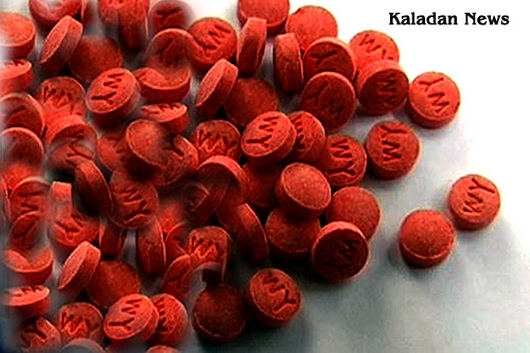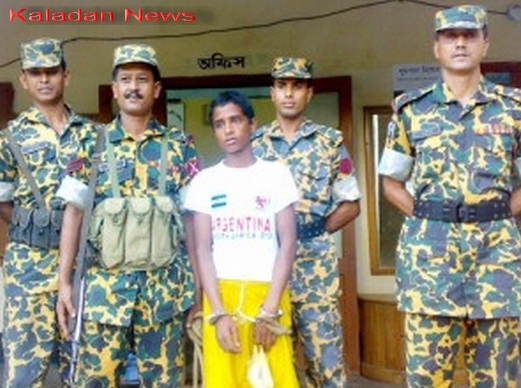Alam (not his real name), a twenty-seven year-old Bangladeshi, smuggled Yaba methamphetamine tablets across Bangladesh from the Burmese border without the knowledge of Bangladeshi authorities for over six months. The only reason he decided to stop his involvement with the drug trade was that he was cheated by a partner.

Methamphetamine is a white, odorless, bitter-tasting crystalline powder that is usually taken orally, by needle injection, or by smoking. The drug affects the central nervous system of the user, and is highly addictive. Yaba is type of methamphetamine tablet, usually red in color, that is very common throughout Asia.
Alam said in a recent interview that he smuggled Yaba tablets from Teknaf to the capital of Dhaka because of the high profitability, and that he bought Yaba tablets from a dealer who lives in Teknaf.
“I live along with my father and brothers in Teknaf Union. I have two brothers, one sister, and a father. My mother died with malaria and jaundice two years ago.
“I am the elder of my brothers and sisters. In the past, I have worked hard in teashops, as a daily laborer, and with other jobs.
“I earned a monthly salary of 2000 to 3000 Taka ($25–38 US) from the teashops where I last worked in Teknaf and Cox’s Bazar District.”
Later, Alam left his job and started smuggling Yaba tablets when he realized he could earn considerably more money.
Alam would buy one Yaba tablet for 50 to 100 Taka ($.65–$1.30 US) from a dealer he refused to name who operates along the Bangladeshi-Burma border. The dealer frequently travels to Burma and brings Yaba tablets from Maungdaw, Arakan State.
“I could then sell one tablet for 300 to 500 Taka ($3.90–6.50 US) in the capital of Dhaka,” said Alam, who says he never went to Burma to purchase the drugs himself.
Alam was never caught by Bangladesh authorities smuggling the methamphetamine pills, but during the first week of October 2011, he lost nearly 500,000 Taka ($6,490 US) when he was cheated by a partner in Dhaka.
Now, Alam has now stopped smuggling Yaba tablets since the fall-out with his main partner. He also said that Bangladeshi authorities are becoming more alert about Yaba smuggling across Bangladesh.
Like Alam, many Bangladeshi and Burmese nationals have started dabbling in Yaba smuggling from the Bangladesh-Burma border. They are doing it as they realize the tremendous possibility for profits compared to working in normal, legal jobs.
According to different sources, several Bangladeshi and Burmese nationals were recently arrested with thousands of Yaba tablets by different departments of Bangladeshi authorities in multiple places along the border, in Chittagong, and in Dhaka.

Bangladeshi authorities seized 224,016 Yaba tablets in recent operation from May to October 2011 from different places such as Teknaf, Dum Dum Meah-check-post of Border Guard Bangladesh (BGB), Saydari Para, Cox’s Bazar, Eidgh in Cox’s Bazar District, Dhaka, and others, sources said.
The Border Guard Bangladesh (BGB) and police seize Yaba tablets along the Bangladesh border every single day, said a trader from Teknaf.
The trader said that a large group of drug dealers and smugglers lives along the border area. They distribute Yaba tablets to cities across Bangladesh.
He also says that it is not only fringe drug addicts that use Yaba, but also many students, businessmen, and professionals use the drug on a regular basis.
On condition of anonymity, a businessman in Maungdaw said that many Burmese authorities, including Nasaka border security officers, police, military intelligence, and local Maungdaw town authorities, are involved in illegal narcotic trafficking. He reports that officers travel to Akyab (or Sittwe, the capital of Arakan State) on official visits, and return to the border areas with Yaba.
The source said that the Yaba tablets are produced along the Burma-Thai border, and then smuggled to western Burma by cross-border syndicates on their way to Bangladesh. The majority of pills are destined to be sold in Chittagong, Bangladesh's largest port city with a population of approximately four million.
“Other drug dealers are also using local Bangladeshis to transport drugs to Bangladesh, as the Rohingya from northern Arakan State are not allowed to travel to Akyab or other towns expect Buthidaung. The drugs are brought to Maungdaw by officers who use the Rohingya people along the way, and who encourage local young people in Maungdaw to engage in the drug business,” he said.
The Bangladeshi authorities are trying to stop the trafficking of drugs into their country, and have recently tightened security along the Burma-Bangladesh border, an official said.
In addition, the Border Guard Bangladesh (BGB) destroyed a large amount of drugs worth nearly 1,800,000 Taka ($2,337 US) on October 4. The different kinds of drugs had been seized by BGB officers along the border from last May 21, 2011 to September 2011, according to BGB sources.
“Among the destroyed drugs were 493 Yaba tablets, 50 grams of tobacco, 255 bottles of wine, 25 bottles of beer and 372 liters of wine. Everything was destroyed by BGB officers at 1 pm.”
On November 12, a high-level delegation from Bangladesh went to Burma to discuss the issue of drug trafficking along the border and furthering cooperating to stop the smuggling of Yaba and other drugs, said Home Minister Advocate Sahara Khatun while speaking at a workshop as the chief guest in the conference of the Narcotics Control Department (NCD).
The Home Minister called upon all concerned authorities to form anti-drug organizations in each area, and to support campaigns against drug abuse by creating awareness among the people.
"One person might die in a gun attack, but an entire family becomes ruined when a member of the family uses illegal drugs," the Home Minister commented.
"200,000 million Taka ($26 million US) is spent each year for the purchase of illegal drugs, and the number of addicted people in the country now stands at more than 46 million," said Bangladesh’s Home Secretary.



